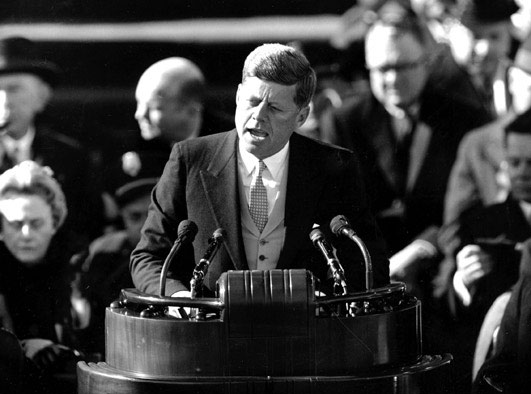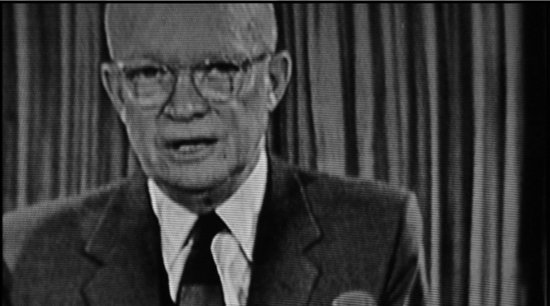Two Speeches, Two Messages
/ This week marks the 50th anniversary of two important speeches in recent United States history, President John F. Kennedy's Inauguration Speech on January 20th, 1961, and President Dwight Eisenhower's final farewell to the nation on January 17th. One reflects the honest assessment of a president unchained and free to speak, the other constrained by politics and optimism. In a large way, each speech speaks to one's supporters, but also to the base elements that helps define the right and the left in the United States, and in a very real way, provide an excellent primer on not only the environment of the Cold War, but also some of the roots of political speculative fiction and ideas that helped to define an generation and an art that they consumed.
This week marks the 50th anniversary of two important speeches in recent United States history, President John F. Kennedy's Inauguration Speech on January 20th, 1961, and President Dwight Eisenhower's final farewell to the nation on January 17th. One reflects the honest assessment of a president unchained and free to speak, the other constrained by politics and optimism. In a large way, each speech speaks to one's supporters, but also to the base elements that helps define the right and the left in the United States, and in a very real way, provide an excellent primer on not only the environment of the Cold War, but also some of the roots of political speculative fiction and ideas that helped to define an generation and an art that they consumed.
Eisenhower's speech is best known as the one where he warns against the establishment of a 'Military-Industrial Complex', famously stating:
"American makers of plowshares could, with time and as required, make swords as well. But now we no longer risk emergency improvisation of national defense; we have been compelled to create a permanent armaments industry of vast proportions. Added to this, three and a half million men and women are directly engaged in the defense establishment. We annually spend on military security more than the net income of all United States corporations."
There are some dense concepts and history behind this statement. The role of the United States and its relationship around the world was drastically altered in the years following the First and Second World Wars. Untouched by direct war on its borders, the United States, through the intense demands of warfare found itself an industrial, political and social savior of the world, and it remained through to the Cold War, with a conflict just five years later in Korea. Warfare on the scale of the Second World War has not been seen since, despite the rise of a second superpower in the form of the Soviet Union, a power that would directly impact the stance of the United States.

It would be interesting to see some form of alternate timeline, one where the Soviet Union didn't rise as it did, to see if the arms industry in the United States would continue onwards. The rise of a permanent arms industry and the rise in perceived threats against the United States and its interests are interlinked. This is not to say that there aren't grave threats against the country at that point in time - there were - but the way in which those threats were addressed were impacted by hostilities.
Kennedy seems to understand this in his own speech three days later, and opens with the following:
"The world is very different now. For man holds in his mortal hands the power to abolish all forms of human poverty and all forms of human life. And yet, the same revolutionary beliefs for which our forebears fought are still at issue around the globe -- the belief that the rights of man come not from the generosity of the state, but from the hand of God."
This felt strange to me, and it feels off when compared to the more memorable point in Kennedy's speech: "And so, my fellow Americans, ask not what your country can do for you, ask what you can do for your country."
The differences between Eisenhower and Kennedy's speech are markedly clear, and are completely at odds with one another, something not entirely surprising, considering the two men come from very different political backgrounds, and entered the executive branch with very different goals. Kennedy, a Democrat, sought to use the abilities of the government to help the people. Eisenhower sought to rein in what he saw as extensive governmental control over the country following the World Wars, feeling that government held back the country's abilities to grow and prosper. Put simply, both goals are exceedingly noble, good and helpful in different ways.
The roots of their political philosophies, however, spell some different futures and implications. Eisenhower presided over a point in time where the world faced a very real and credible threat from the Soviet Union, and ourselves during the Cold War. In a large way, his efforts to scale back the federal government and the spending that it incurred went towards efforts to scale back the conflict between the U.S. and the U.S.S.R., and to let free market capitalism take the reins:
"Today, the solitary inventor, tinkering in his shop, has been overshadowed by task forces of scientists in laboratories and testing fields. In the same fashion, the free university, historically the fountainhead of free ideas and scientific discovery, has experienced a revolution in the conduct of research. Partially because of the huge costs involved, a government contract becomes virtually a substitute for intellectual curiosity. For every blackboard there are now hundreds of new electronic computers. "
This is a republican idea, in its purest form, and one that has several strong points to make: without the help of the federal government, how much would be different in the scientific progress of the United States? Certainly the development of rockets and intercontinental ballistic missiles would be changed, but as such, so to would scientific wonders such what programs such as NASA accomplished over their own histories. Eisenhower also ignores, to an extent, the reach at which industry has a hand in directing such scientific research, and I'm not sure that there's any different at times between a country that's governed by an overarching Federal Government and a strong corporate society.
Kennedy, on the other hand, looked towards the future with a stronger government leading the way and helping those in need, the ideals of the Democratic side of the coin together. A stronger government would help protect the nation against those who sought to do it harm (and we're ignoring here the idea that part of the problem is ourselves and our actions) and at the same time, support those in need, around the world. This, in a large way, is a reversal of what Eisenhower sought to do with his presidency, by reducing the need for the United States to combat communism around the world in small engagements by creating an arms race set to deter the Soviet Union. Kennedy's speech is one that is full of optimism, promising to combat "the common enemies of man: tyranny, poverty, disease and war itself". Noble goals, but ones that, in unrestricted form under his beliefs, ultimately lead to fascism, where Eisenhower's, taken to extremes, lead to an absolute libertarian and anarchist state.
This is where both speeches feel as though they are prime grounds for speculative fiction: in the extremes. "Where Kennedy states: Ask not what your country can do for you, but what you can do for your country," many took it as a call for well intentioned public service, and went on to do this, while others could very well interpret that as a call for the citizens to serve the state absolutely. After reading Brave New Worlds, it's the start of a thought that could potentially lead to a very dark place for the country, and the very opposite of what is intended. (Note, I don't believe that this is what Kennedy intended - we're speaking in hypothetical terms here.) At the same time, Eisenhower notes "The prospect of domination of the nation's scholars by Federal employment, project allocations and the power of money is ever present and gravely to be regarded.", and is as far away from what Kennedy noted just days later as Eisenhower was interested in going to the Moon. At the same time, while warning against the union of Government, Military and Industry, it's clear that he felt that a stronger corporate culture would help to guide the country to a better place, both leaving the people themselves to be free on their own (a good thing) but at the same time, slaves to a consumer culture. (This is also not to suppose that this was Eisenhower's intentions either).
Both Presidents stood in 1961 at the edge, looking into a murky future that held no clear answers for either philosophy that guided them. Their speeches are ones of optimism, importance and of warnings for the future. Of the pair, I believe that Eisenhower's was by far the most honest, tempered with experience and the freedom of being released from the requirements to help his successor into office. Kennedy spoke to his constituents, noting the troubles ahead, and emphasizing that they were the ones who made up the future, and that they, as a whole, could help make the future a better place.
